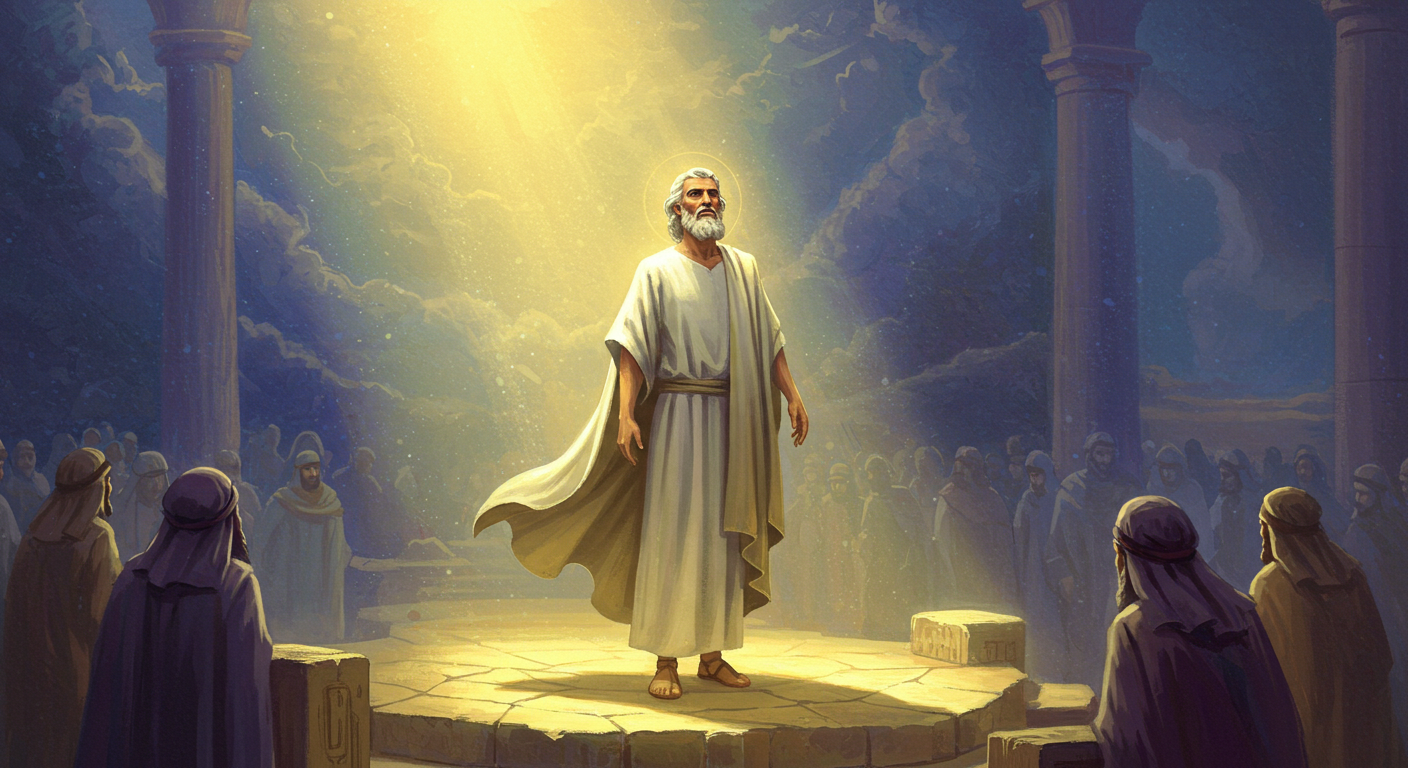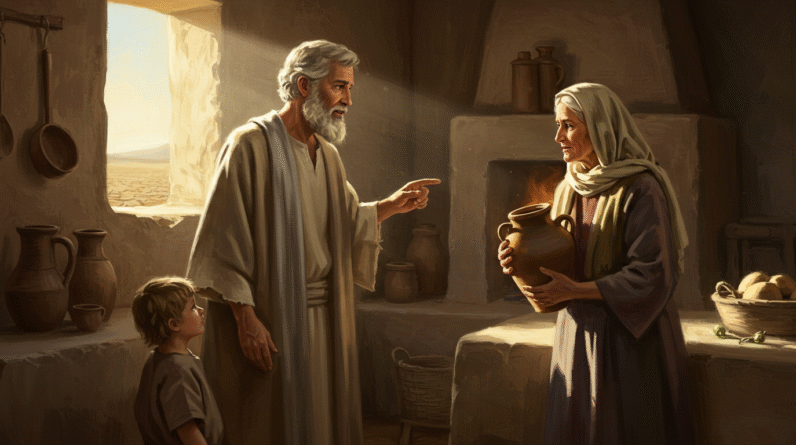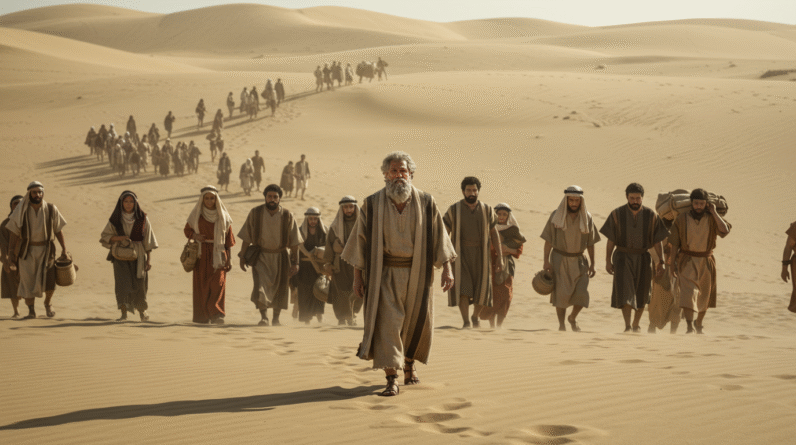Explore the story of Isaiah, a biblical figure who embraces the divine call of prophecy with unwavering faith, impacting both his time and future generations.
Isaiah: Embracing the Call of Prophecy

Introduction
Have you ever felt the undeniable weight of a calling so profound that it changes the course of your life? Isaiah, a towering figure in biblical history, experienced this when he was called to be a prophet. Revered as one of the major prophets in the Old Testament, Isaiah’s significance lies not only in his profound prophecies but also in his unwavering devotion to God’s call. A pivotal verse in his story, Isaiah 6:8, captures the essence of his mission: “Then I heard the voice of the Lord saying, ‘Whom shall I send? And who will go for us?’ And I said, ‘Here am I. Send me!’”. With these words, Isaiah embarked on a journey that would echo through eternity.
Historical Background
Isaiah lived during a tumultuous period in Judah’s history, spanning the reigns of four kings: Uzziah, Jotham, Ahaz, and Hezekiah (Isaiah 1:1). The 8th century BCE was marked by political upheaval and spiritual decay. The Assyrian Empire was on the rise, posing a significant threat to the stability of the region. Internally, Judah grappled with corruption and idolatry. The Israelites were divided and often strayed from their covenant with God. Isaiah interacted with key figures like King Hezekiah, whom he advised during the Assyrian siege, and his message was particularly relevant against this backdrop of instability and moral decline.
God’s Call and Mission
Isaiah’s calling was as dramatic as it was divine. In a vision, he saw the Lord seated on a throne, surrounded by seraphim, and the temple filled with smoke (Isaiah 6:1-4). In this awe-inspiring moment, Isaiah confronted his own humanity, crying out about his unworthiness. It was then that seraphim touched his lips with a live coal, symbolically cleansing him (Isaiah 6:5-7). When God sought a messenger, Isaiah responded with readiness and willingness, embodying a complete commitment to God’s work. His primary mission was to call God’s people back to righteousness and to warn them of impending judgment if they continued down their rebellious path.
Key Events and Prophecies
Isaiah’s prophetic ministry was marked by several pivotal events and profound prophecies. He foretold the fall of Jerusalem and the captivity that would come if the people did not repent (Isaiah 39:6-7). One of his most remarkable prophecies was the foretelling of a suffering servant, a prophecy Christians later see fulfilled in Jesus Christ (Isaiah 53). Isaiah also spoke of the coming of Emmanuel, a prophecy pointing to the birth of Christ (Isaiah 7:14). Moreover, his vision of a peaceful and just kingdom remains one of the most beautiful in biblical literature, inspiring hope throughout generations (Isaiah 11:6-9).
Challenges and Opposition
Despite his devotion, Isaiah faced considerable opposition. The rulers and the people often rejected his messages, preferring false prophets who spoke of peace rather than acknowledging their transgressions. His warnings of judgment and calls for repentance were unpopular, yet Isaiah persisted. He remained faithful amidst disbelief and spiritual apathy, demonstrating resilience and steadfastness. In his personal struggles, Isaiah battled the loneliness and sorrow that came with being a prophet, yet he drew strength from his faith and the vision he received, remaining unwavering in his mission.
Legacy and Impact
Isaiah’s legacy is vast and enduring. His words are woven throughout both the Old and New Testaments. The Book of Isaiah is frequently referenced in the New Testament, affirming the timeless relevance of his prophecies (Matthew 3:3). His anticipation of a Messiah who would bring salvation has profoundly shaped Christian theology. Considered a poetic masterpiece, the Book of Isaiah challenges and inspires readers with its themes of justice, righteousness, and hope. Isaiah’s influence is seen not only in religious texts but also in art, literature, and music that continue to draw upon his evocative imagery and powerful messages.
Lessons from Isaiah
There is much to learn from Isaiah’s life and prophecies. One major lesson is the importance of faithfulness to God’s call, even when it is difficult or inconvenient. Isaiah models unwavering obedience and courage, encouraging believers today to stand steadfast in their convictions. His prophecies remind us of the necessity of repentance and righteousness. They challenge us to look beyond immediate circumstances and focus on God’s ultimate plan. Isaiah’s messages of hope and redemption remain as comforting today as they were centuries ago, urging us to trust in a future shaped by divine justice and love.
Conclusion
Isaiah’s role as a prophet was crucial in biblical history, providing guidance during times of turmoil and pointing towards a future of redemption and hope. His life reminds us that profound impact often comes from unwavering faith and commitment to a divine calling. As you reflect on his story, consider how God’s call might manifest in your own life. Are you ready to respond, “Here am I. Send me”? If Isaiah’s journey has inspired you, please consider clapping for this article, leaving a comment with your thoughts, and subscribing to our Medium newsletter for more insightful updates.
Acknowledgment: All Bible verses referenced in this article were accessed via Bible Gateway (or Bible Hub)







